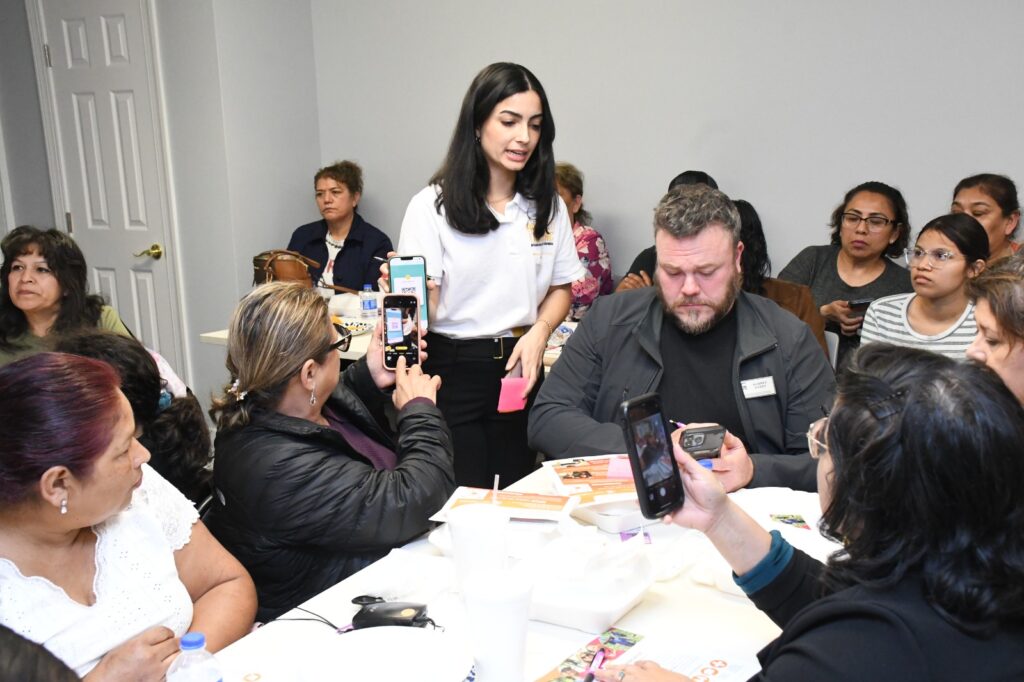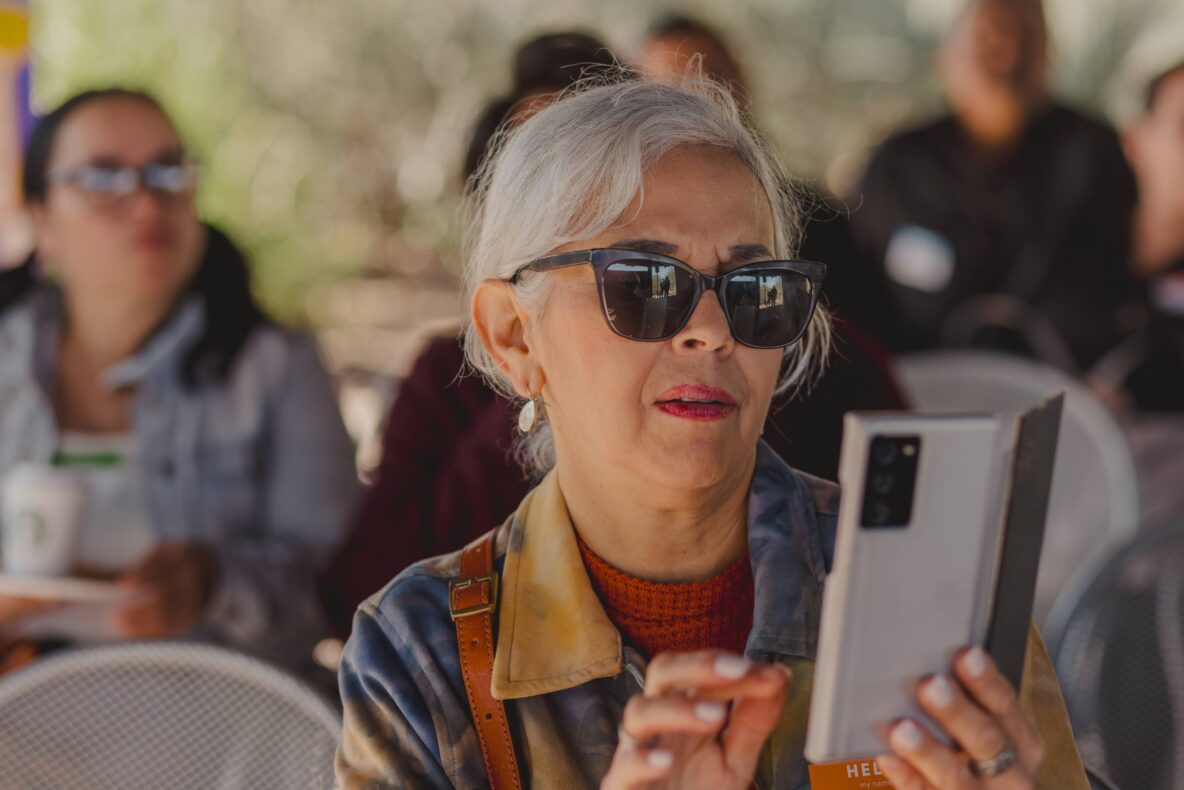If this blog post were a text or WhatsApp message, it would be short, sweet and to the point. It may be written in a different language. It may include emojis or a prompt to respond. It would help the recipient make better-informed decisions.
Delivering news and information through text-messaging systems or platforms like WhatsApp might sound unusual, but it’s at the heart of news organizations like Conecta Arizona, Documented, El Tímpano, Enlace Latino NC and Outlier Media.
Those organizations all received funding as part of Press Forward’s Aligned Grantmaking strategy, which has invested $54 million in local news organizations since launching last fall. Together, these news organizations received a total of $4.7 million from the John S. and James L. Knight, John D. and Catherine T. MacArthur and Skyline foundations.
Jenny Montoya Tansey, a senior program officer with Skyline Foundation’s Just Democracy program and co-chair of Press Forward’s Aligned Grantmaking team along with Democracy Fund’s Angelica Das, said that supporting these organizations was a way to amplify their unique approach to news.
“There are many funders and many people that don’t have enough exposure to these new models for reporting and information,” Montoya Tansey said. “My hope is that, by aligning around some leaders in the field who are doing inspiring, transformative, impactful work, we can help make this space a bit more legible.”
In particular, Montoya Tansey appreciates that messaging platforms — and messaging in languages besides English — allow organizations to reach people who may otherwise not have easy access to news. Beyond English and Spanish, some organizations, like Documented, are delivering news in additional languages such as Chinese and Haitian Kreyol, providing local information to immigrant communities that have too often been overlooked by the media.
She also believes that the two-way communication that messaging provides helps to solve a major problem facing journalism: a lack of trust.
“What fosters trust?” Montoya Tansey asked. “Think about it on a personal relationship level. You want to feel like people are meeting you where you are, and you want to feel like people are listening to you.”

Claudia Rivera, political and immigration reporter at Enlace NC helps a woman subscribe to WhatsApp during a community listening session (Photo courtesy ELNC)
In May 2020, Maritza Felix, founder of Conecta Arizona, began sharing and verifying information about the COVID pandemic in Spanish with a group of friends and family using WhatsApp. Four years later, that group — located throughout Arizona and the Mexican state of Sonora — has grown to more than 10,000 people. Conecta Arizona has grown in scope, too: Felix and her four-person team share information on a variety of topics, including migration, education, health, money and culture.
The Conecta Arizona team communicates daily with their community through WhatsApp. In the mornings, they share headlines of the day, a fun fact and a daily survey. Every afternoon, they open a group conversation about a topic in the news. And once a week, they host La Hora del Cafecito, or coffee time, when an expert on a particular timely subject answers community questions.
For several years, Felix said, she felt like the work she was doing at Conecta Arizona was misunderstood or undervalued. But the funding they received — $350,000 from MacArthur — marks a significant shift.
“It shows that they understand the dissatisfaction that we have [with traditional media models],” Felix explained. “Now, for the first time, our dissatisfaction and their dissatisfaction are the same. It feels like we can actually change something.”
For Paola Jaramillo, co-founder and executive editor of Enlace Latino NC, the funding is an industry-wide win. Enlace Latino NC, which delivers news to and connects with Spanish-speaking residents of North Carolina through WhatsApp, among other platforms, received multi-year grants of $350,000 from MacArthur and $750,000 from Skyline Foundation.
Jaramillo said the organization plans to use that money to expand its coverage “and work toward a more inclusive and representative news ecosystem in North Carolina.” As in past election years, Enlace Latino will hold nonpartisan community candidate forums throughout 2024, bringing candidates and the Latino community “closer to each other, in a safe, bilingual, and bicultural space.” Jaramillo’s team is also working on a voter’s guide for the November general elections, which will offer key questions and answers about the electoral process in Spanish.
“These grants are not just about us,” she explained. “They are about creating a sustainable model for local news, and what it means to do that for the Latino community. Enlace Latino NC’s tools and reporting fill critical gaps and meet readers where they are, in their languages, with the information they need to thrive.”
Outlier Media Founder and Editor-in-Chief Sarah Alvarez plans to use her organization’s funding to streamline Outlier’s newsroom operations and ultimately benefit other news outlets looking to connect with underserved communities through messaging. Outlier began in 2016 as an SMS service that delivers critical information about housing, utilities and other topics to Detroit residents.
With the support of two multi-year grants — $1 million from MacArthur and $500,000 from Knight — Outlier is bringing its text-messaging service in-house, building a customized tech stack that will allow reporters to communicate and interact with Detroiters in new and improved ways. Alvarez said they are aiming to launch the new technology by the summer and, after a few months of testing, offer the service to other small newsrooms.
Alvarez came up with the concept for Outlier’s SMS-based model during her year as John S. Knight Fellow at Stanford University. While her goal was to create “a very valuable tool,” Alvarez said her bigger ambition was to introduce a new model to the journalism industry.
“I wanted to get people talking about information gaps and to get people thinking about new ways to deliver information from a news perspective,” she said.
Eight years later, Alvarez sees that shift happening — and the Press Forward funding is proof.
“I am relieved, and I find it gratifying, to see people thinking about an information gap framework,” she said. “Leaders are finally embracing the idea that filling information gaps is a legitimate task that news should be involved in. When I started Outlier, that was not the case.”
In California, Madeleine Bair understands “there is a huge gap to fill in journalism that serves, reflects and engages the 1.5 million Spanish- and Mam-speaking immigrants who live in the Bay Area.” She launched El Tímpano in 2018 in hopes of filling that gap.
In a short amount of time and with a small team, El Tímpano has had an impact. In 2021, for example, the news organization heard from California Governor Gavin Newsom’s office that their reporting on how indigenous Mayan immigrants were experiencing the pandemic “was circulating along the governor’s staff and was helpful for them as they were thinking through how the pandemic is impacting different communities and how to respond to that,” Bair said.
With multi-year grants of $500,000 from MacArthur and $750,000 from Skyline Foundation, Bair plans to grow El Tímpano’s community outreach team that is working to meet and build trust with Latino and Mayan immigrants across the Bay Area’s nine counties. Bair said they will also expand their newsroom, specifically increasing their capacity to respond to reader text messages.
That growth is much-needed, Bair said. “We’ve created two-way channels of communication with our core audience of Spanish-speaking immigrants and, every week, people share stories, concerns and questions with us.” Now, with an expanded team, Bair said her team will be able to amplify those stories, answer questions and address concerns.
“One of the challenges that we had early on in raising funds was that the journalism that we were producing doesn’t look like conventional journalism,” Bair explained. Because El Tímpano’s coverage was in different languages and on different platforms than most funders were using, she said, “it took a lot more education” to explain the value of their work.
That’s why the Press Forward funding is so meaningful — a feeling shared by Bair and all the aligned grantmaking recipients.
“It’s not only incredibly impactful for us, but I hope it can help other funders who value journalism to see that not all journalism is in the form of long, investigative stories on a website,” Bair said. “It can be just as impactful, if not more so, when it is delivered in different ways for different communities.”
Press Forward’s first open call for funding, in at least one of Press Forward’s funding priority areas, will take place in late April. Before then, potential grantees will be asked to submit profiles on an online platform so that partners in Press Forward’s funding coalition can learn more about them. Learn more about how Press Forward funds on our site.

